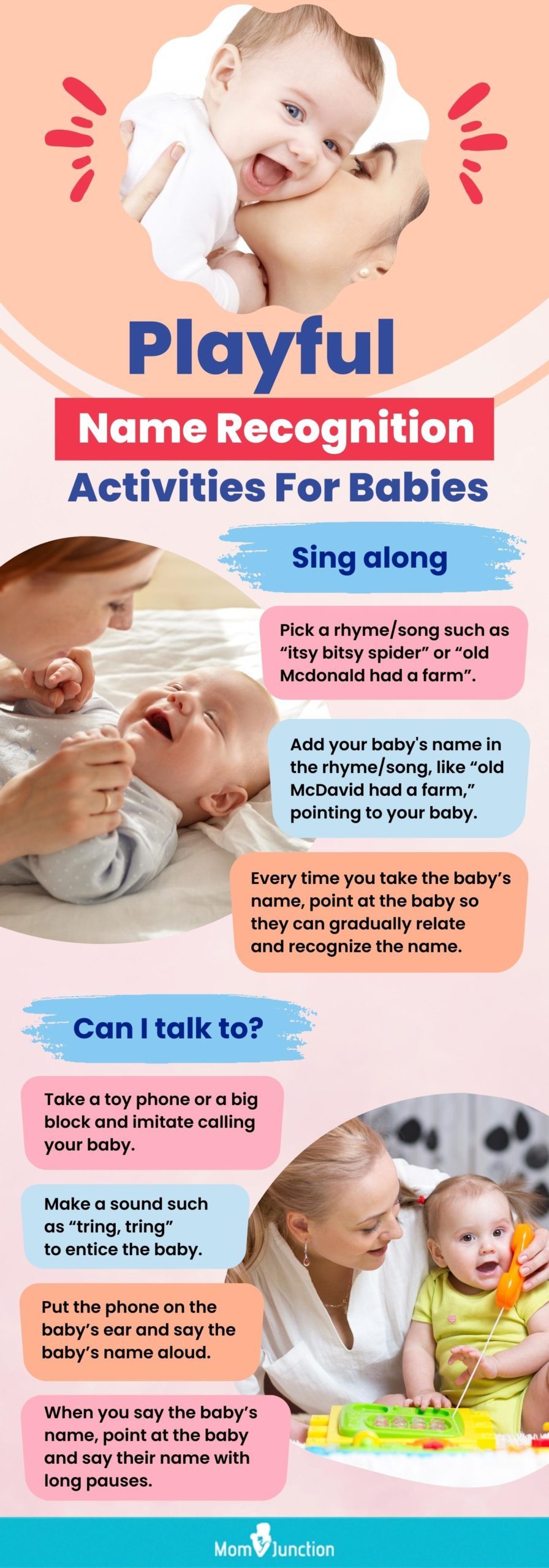Babies typically learn to recognize their name around 6-7 months of age, an important milestone in cognitive development. This recognition signifies their growing awareness of self-identity and external stimuli.
It’s an exciting moment for parents and caregivers to witness their little ones responding to their own name. As babies grow and develop, they begin to master various cognitive and language skills. Learning their name is a key step in this process, as it indicates the onset of self-awareness and social interaction.
Parents can encourage this development by using their baby’s name frequently in conversation and play. By doing so, they can help reinforce the association between the name and the child, further aiding in their cognitive growth. Understanding the timeline for when babies learn their name provides insights into their developmental journey and supports caregivers in fostering their little one’s cognitive development.

The Development Of Baby’s Recognition Skills
Babies undergo a fascinating journey of developing recognition skills, including the ability to recognize their own name. Understanding the stages of this development provides insight into their cognitive progression and aids in fostering healthy development. In this section, we delve into the early signs of name recognition and the factors that can influence a baby’s recognition abilities.
Early Signs Of Name Recognition, babies learn their name
Babies typically start demonstrating early signs of name recognition around 4 to 7 months of age. During this time, they may exhibit responsiveness to their name being called, often by turning their heads or displaying excitement. Additionally, they may display increased attentiveness when their name is mentioned, indicating an emerging cognitive connection with their own name.
Factors Affecting Recognition Abilities
Several factors can influence a baby’s recognition abilities, including the frequency of exposure to their name, the tone of voice used when calling their name, and the overall level of cognitive development. Ensuring consistent and positive reinforcement when using their name can significantly contribute to the development of a baby’s recognition skills.
The Role Of Repetition And Consistency
When it comes to babies learning their name, repetition and consistency play a crucial role. Babies begin to recognize and respond to their names around the age of six months. However, it is important to understand that learning their name is a gradual process that takes time and consistent reinforcement.
Importance Of Repetition In Name Learning
Repetition is key in helping babies learn their names. By repeatedly hearing their name in different contexts, babies begin to associate that sound with their own identity. It’s like creating a mental link between the word and themselves.
When interacting with your baby, make a conscious effort to say their name frequently. For example, you can use their name while feeding, playing, or during daily activities. By incorporating their name into everyday routines, you reinforce the association and help them build a stronger connection to their own identity.
Repetition helps to strengthen the neural pathways in their brain, making it easier for them to remember and respond to their name. Keep in mind that babies have a limited attention span, so try to keep the repetition short but frequent.
Creating A Consistent Name-response Environment
In addition to repetition, consistency is crucial in helping babies learn their names. Consistency means ensuring a predictable and stable name-response environment for your baby.
Here are some tips to create a consistent name-response environment:
- Use the same name consistently: Ensure that you and other caregivers use the same name for your baby. This avoids confusion and helps them recognize their name more quickly.
- Use a clear and distinct pronunciation: Babies are sensitive to sounds, so enunciate their name clearly and consistently. This helps them recognize their name even if there are slight variations in pronunciation.
- Avoid using nicknames too early: While nicknames can be fun, introducing them too early may confuse your baby. Stick to their given name during the initial stages of name learning.
By creating a consistent name-response environment, you provide a solid foundation for your baby to learn and respond to their name. Remember, practice and patience are key in this process.
Parental Influence On Name Learning
Babies typically start learning their name around 4-5 months old, responding to it by turning their head. Parental repetition and positive reinforcement play a crucial role in the process of name recognition and learning for infants.
Babies learning their name is an important milestone in their cognitive development. In the early months, babies recognize familiar voices, faces, and sounds, and gradually begin to associate those with their own name. Parental influence plays a crucial role in helping babies learn and recognize their name. By actively supporting name recognition, parents can facilitate language development and strengthen the bond with their little ones.
Ways Parents Can Support Name Recognition
Parents can employ various strategies to enhance their baby’s ability to learn their name. Here are some effective ways to support name recognition:
- Repetition: Frequent repetition of the baby’s name in a clear and distinct manner helps them develop an auditory recognition of their name. Using their name in different contexts, such as during playtime or feeding, reinforces the association.
- Pointing and Visual Cues: When saying the baby’s name, parents can point to themselves or to a picture of the baby to create a visual link between the name and the person. This visual reinforcement aids in connecting the spoken name with its corresponding referent.
- Personalized Songs and Rhymes: Creating catchy songs or rhymes that incorporate the baby’s name can make name learning more enjoyable and memorable. Singing these personalized tunes regularly can help reinforce the connection between the name and the baby’s identity.
- Name Games: Engaging in playful activities focused on name recognition can be an effective learning tool. For example, parents can use flashcards with the baby’s name or play a game of peek-a-boo using their name instead of “boo.”
Avoiding Confusion In Name Introduction
When introducing the baby’s name, it’s essential to avoid confusion and ensure a clear association with their identity. Here are some strategies to prevent confusion in name introduction:
- Consistency: Using the same name consistently when addressing the baby helps avoid mixed signals. Avoiding frequent nickname variations can also prevent confusion.
- Clear Pronunciation: Pronouncing the baby’s name clearly and consistently facilitates their understanding and recognition. Taking care to articulate the name correctly ensures a clear auditory representation for the baby.
- Positive Reinforcement: Associating positive experiences with the baby’s name helps foster a positive association. Using the baby’s name during affectionate interactions can create a sense of familiarity and reinforce their identity.
Overall, parental influence plays a significant role in babies learning their name. By employing supportive strategies such as repetition, visual cues, personalized songs, and playing name games, parents can facilitate the baby’s name recognition. Avoiding confusion through consistency, clear pronunciation, and positive reinforcement further strengthens the connection between the name and the baby’s identity. By actively participating in their baby’s name learning journey, parents can contribute to their overall cognitive development, language acquisition, and emotional bonding.
Cultural Variances In Name Learning
When it comes to cultural variances in name learning, it’s fascinating to explore how different societies impact the recognition and teaching of a baby’s name. Understanding the diverse approaches to name recognition and teaching can shed light on the cultural significance placed on names within various communities.
Impact Of Cultural Practices On Name Recognition
In some cultures, the significance of a name goes beyond mere identification. Naming ceremonies and rituals are common in certain communities, placing strong emphasis on the spiritual and symbolic meaning of a child’s name. This cultural practice plays a crucial role in imprinting the name on the baby’s consciousness from an early age, influencing the speed and depth of name recognition.
Diverse Approaches To Name Teaching
Across different cultures, there are diverse methods employed to teach babies their names. Families may use repetitive verbal cues, incorporating the name into songs, or creating games to reinforce name recognition. Additionally, some cultures emphasize the use of familial or honorific titles alongside the given name, instilling a sense of identity and belonging from infancy.
Timing Of Name Recognition Milestones
Babies go through specific stages when learning to recognize their names. Let’s delve into the average age for recognizing names and the individual variations in this crucial milestone.
Average Age For Recognizing Names
On average, babies start recognizing their names around 5 to 7 months old. Simple repetition and positive reinforcement play a significant role in this recognition.
Individual Variations In Name Learning
Each baby is unique, and some may pick up their name earlier, while others might take longer. Factors like environment and interaction influence this variability.

Strategies For Encouraging Name Learning
Introducing your baby to their name is a significant milestone in their development. By incorporating engaging practices, you can help your little one grasp their name quicker.
Incorporating Name Practice In Daily Routines
- Repetitively say your baby’s name during feeding or diaper changes.
- Point to objects and say their names, including your baby’s name.
- Use personalized items like blankets with their name on it.
Utilizing Interactive Name Games
- Play peek-a-boo using your baby’s name.
- Use flashcards with their name and images for visual association.
- Incorporate name songs or rhymes during playtime.
Addressing Challenges In Name Learning
Babies begin recognizing their name as early as 4-5 months, responding to it around 6-7 months. Repetition and positive reinforcement aid in name learning, key for early social and cognitive development. Addressing challenges in name learning involves consistent use and association with positive experiences.
Dealing With Name Confusion, Overcoming Name-responsiveness Issues

Celebrating Baby’s Name Recognition Achievement
Creating Positive Associations With The Name
Babies are highly receptive to positive reinforcement and love. By associating their name with fun and enjoyable experiences, you can create a positive association in their minds. Here are some ways to do this:
- Use their name when playing games, singing songs, or reading stories together.
- Include their name in conversations, such as talking about their day or discussing fun activities.
- Personalize their belongings with their name, like their toy box or their own special blanket.
- Praise and encourage them when they respond to their name, reinforcing the positive connection.
Encouraging Continued Name Engagement
Once your baby has started recognizing their name, it’s important to keep encouraging their engagement with it. This helps solidify their name recognition and ensures they continue to respond to it consistently. Here are a few strategies to encourage continued name engagement:
- Regularly use their name in everyday interactions, building familiarity and reinforcing their identity.
- Incorporate their name into games and activities that involve them solving simple challenges or tasks.
- Encourage family members and friends to use their name when interacting with them.
- Point out and label objects or pictures with their name to help them make connections.
- Celebrate their efforts when they respond to their name, giving them a sense of accomplishment.
At What Age Should Baby Respond To Name?
Babies typically start responding to their name around 7 to 9 months old. It’s an important milestone in their development.
How Do I Teach My Baby His Name?
Encourage your baby’s name recognition by consistently using it in interactions and play. Repeat the name in a clear and positive tone, use it during feeding, playtime, and gentle touch. Reinforce teaching moments with smiles and eye contact.
At What Age Do Babies Recognize Their Mom?
Babies usually recognize their moms at around 2 to 3 months of age, as they develop their visual abilities and form strong emotional bonds.
When Should I Start Thinking About My Baby’s Name?
Start thinking about your baby’s name early in your pregnancy. It’s okay to take your time, but having a name in mind can give you a sense of direction. Discuss options with your partner and consider cultural and family influences when choosing.
Conclusion
In the first stages of their development, babies begin to recognize and respond to their name. Understanding when babies learn their name can help parents and caregivers interact effectively. By understanding this important milestone, they can communicate and engage with their little ones in a more meaningful way.
As babies grow, their name recognition skills will continue to improve, paving the way for crucial language and social development.
” when do babies learn their name, when do babies learn their name “





